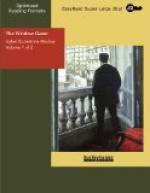“An Indian what?” he asked blankly.
“An Indian secretary—a female one.”
“Nonsense. Indians aren’t secretaries.”
But Aunt Caroline had “had a feeling.” “It was your-self who suggested that she might be a girl,” she declared stubbornly, “and if she is a girl, she must be an Indian. Indians are different—look at Pullman porters.”
The doctor gasped.
“Even I don’t mind a Pullman porter,” finished Aunt Caroline grandly.
“That’s very nice,” the doctor struggled to adjust him-self. “But Pullman porters are not Indians, and even if they were I can’t quite see how it affects Benis and his lady secretary.”
“The principle,” said Aunt Caroline, “is the same.”
Rogers wondered if his brain were going. At any rate he felt that he needed a smoke. Aunt Caroline did not like smoke, so comparative privacy was assured. Also, a good smoke might show him a way out of his difficulty.
It didn’t. At the end of the second cigar the cold fact, imparted by the clerk in the steamship office, that Professor Spence and wife had preceded them upon this very boat, was still a cold fact and nothing more. The long letter from the bridegroom which would have made things plain had passed him on his trip across the continent and was even now lying, with other unopened mail, in his Bainbridge office.
If Benis were married, then the bride could be no other than the nurse-secretary he had written about in that one inconsequent letter to which he, Rogers, had replied with unmistakable warning. But the thing seemed scarcely credible. If it were a fact, then it might very easily be a tragedy also. Marriage in such haste and under such circumstances could scarcely be other than a mistake, and considering the quality of Benis Spence, a most serious one.
John Rogers was very fond of his eccentric friend and the threatened disaster loomed almost personal. He felt himself to blame too, for the advice which had thrown Spence directly from the frying-pan of Aunt Caroline into the fire of a sterner fate. Add to all this a keen feeling of unwarranted intrusion and we have some idea of the state of mind with which Dr. John Rogers saw the white tents of the campers as the steamer put in at Friendly Bay.
“There are two tents,” said Aunt Caroline lowering her lorgnette. “I shall be quite comfortable.”
The doctor did not smile. His sense of humor was suffering from temporary exhaustion and his strongest consciousness was a feeling of relief that neither Benis nor anyone else appeared to notice their arrival. Even the unique spectacle of a middle-aged lady in elastic-sided boots proceeding on tiptoe, and with all the tactics of a scouting party, toward the evidently deserted tents provoked no demonstration from anyone.
“They’re not here!” called the scouting party in a carrying whisper.
“Obviously not.” The doctor wiped his heated fore-head. “Probably they’ve gone for the night. Then you’ll have to marry me to save my reputation.”




